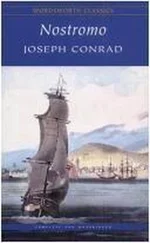Joseph Conrad - Nostromo, a Tale of the Seaboard
Здесь есть возможность читать онлайн «Joseph Conrad - Nostromo, a Tale of the Seaboard» весь текст электронной книги совершенно бесплатно (целиком полную версию без сокращений). В некоторых случаях можно слушать аудио, скачать через торрент в формате fb2 и присутствует краткое содержание. Жанр: Старинная литература, на английском языке. Описание произведения, (предисловие) а так же отзывы посетителей доступны на портале библиотеки ЛибКат.
- Название:Nostromo, a Tale of the Seaboard
- Автор:
- Жанр:
- Год:неизвестен
- ISBN:нет данных
- Рейтинг книги:4 / 5. Голосов: 1
-
Избранное:Добавить в избранное
- Отзывы:
-
Ваша оценка:
- 80
- 1
- 2
- 3
- 4
- 5
Nostromo, a Tale of the Seaboard: краткое содержание, описание и аннотация
Предлагаем к чтению аннотацию, описание, краткое содержание или предисловие (зависит от того, что написал сам автор книги «Nostromo, a Tale of the Seaboard»). Если вы не нашли необходимую информацию о книге — напишите в комментариях, мы постараемся отыскать её.
Nostromo, a Tale of the Seaboard — читать онлайн бесплатно полную книгу (весь текст) целиком
Ниже представлен текст книги, разбитый по страницам. Система сохранения места последней прочитанной страницы, позволяет с удобством читать онлайн бесплатно книгу «Nostromo, a Tale of the Seaboard», без необходимости каждый раз заново искать на чём Вы остановились. Поставьте закладку, и сможете в любой момент перейти на страницу, на которой закончили чтение.
Интервал:
Закладка:
"We shall organize a popular vote, by yes or no, confiding the destinies of our beloved country to the wisdom and valiance of my heroic brother, the invincible general. A plebiscite. Do you understand?"
And Senor Fuentes, puffing out his leathery cheeks, had inclined his head slightly to the left, letting a thin, bluish jet of smoke escape through his pursed lips. He had understood.
His Excellency was exasperated at the devastation. Not a single chair, table, sofa, etagere or console had been left in the state rooms of the Intendencia. His Excellency, though twitching all over with rage, was restrained from bursting into violence by a sense of his remoteness and isolation. His heroic brother was very far away. Meantime, how was he going to take his siesta? He had expected to find comfort and luxury in the Intendencia after a year of hard camp life, ending with the hardships and privations of the daring dash upon Sulaco—upon the province which was worth more in wealth and influence than all the rest of the Republic's territory. He would get even with Gamacho by-and-by. And Senor Gamacho's oration, delectable to popular ears, went on in the heat and glare of the Plaza like the uncouth howlings of an inferior sort of devil cast into a white-hot furnace. Every moment he had to wipe his streaming face with his bare fore-arm; he had flung off his coat, and had turned up the sleeves of his shirt high above the elbows; but he kept on his head the large cocked hat with white plumes. His ingenuousness cherished this sign of his rank as Commandante of the National Guards. Approving and grave murmurs greeted his periods. His opinion was that war should be declared at once against France, England, Germany, and the United States, who, by introducing railways, mining enterprises, colonization, and under such other shallow pretences, aimed at robbing poor people of their lands, and with the help of these Goths and paralytics, the aristocrats would convert them into toiling and miserable slaves. And the leperos, flinging about the corners of their dirty white mantas, yelled their approbation. General Montero, Gamacho howled with conviction, was the only man equal to the patriotic task. They assented to that, too.
The morning was wearing on; there were already signs of disruption, currents and eddies in the crowd. Some were seeking the shade of the walls and under the trees of the Alameda. Horsemen spurred through, shouting; groups of sombreros set level on heads against the vertical sun were drifting away into the streets, where the open doors of pulperias revealed an enticing gloom resounding with the gentle tinkling of guitars. The National Guards were thinking of siesta, and the eloquence of Gamacho, their chief, was exhausted. Later on, when, in the cooler hours of the afternoon, they tried to assemble again for further consideration of public affairs, detachments of Montero's cavalry camped on the Alameda charged them without parley, at speed, with long lances levelled at their flying backs as far as the ends of the streets. The National Guards of Sulaco were surprised by this proceeding. But they were not indignant. No Costaguanero had ever learned to question the eccentricities of a military force. They were part of the natural order of things. This must be, they concluded, some kind of administrative measure, no doubt. But the motive of it escaped their unaided intelligence, and their chief and orator, Gamacho, Commandante of the National Guard, was lying drunk and asleep in the bosom of his family. His bare feet were upturned in the shadows repulsively, in the manner of a corpse. His eloquent mouth had dropped open. His youngest daughter, scratching her head with one hand, with the other waved a green bough over his scorched and peeling face.
CHAPTER SIX
The declining sun had shifted the shadows from west to east amongst the houses of the town. It had shifted them upon the whole extent of the immense Campo, with the white walls of its haciendas on the knolls dominating the green distances; with its grass-thatched ranches crouching in the folds of ground by the banks of streams; with the dark islands of clustered trees on a clear sea of grass, and the precipitous range of the Cordillera, immense and motionless, emerging from the billows of the lower forests like the barren coast of a land of giants. The sunset rays striking the snow-slope of Higuerota from afar gave it an air of rosy youth, while the serrated mass of distant peaks remained black, as if calcined in the fiery radiance. The undulating surface of the forests seemed powdered with pale gold dust; and away there, beyond Rincon, hidden from the town by two wooded spurs, the rocks of the San Tome gorge, with the flat wall of the mountain itself crowned by gigantic ferns, took on warm tones of brown and yellow, with red rusty streaks, and the dark green clumps of bushes rooted in crevices. From the plain the stamp sheds and the houses of the mine appeared dark and small, high up, like the nests of birds clustered on the ledges of a cliff. The zigzag paths resembled faint tracings scratched on the wall of a cyclopean blockhouse. To the two serenos of the mine on patrol duty, strolling, carbine in hand, and watchful eyes, in the shade of the trees lining the stream near the bridge, Don Pepe, descending the path from the upper plateau, appeared no bigger than a large beetle.
With his air of aimless, insect-like going to and fro upon the face of the rock, Don Pepe's figure kept on descending steadily, and, when near the bottom, sank at last behind the roofs of store-houses, forges, and workshops. For a time the pair of serenos strolled back and forth before the bridge, on which they had stopped a horseman holding a large white envelope in his hand. Then Don Pepe, emerging in the village street from amongst the houses, not a stone's throw from the frontier bridge, approached, striding in wide dark trousers tucked into boots, a white linen jacket, sabre at his side, and revolver at his belt. In this disturbed time nothing could find the Senor Gobernador with his boots off, as the saying is.
At a slight nod from one of the serenos, the man, a messenger from the town, dismounted, and crossed the bridge, leading his horse by the bridle.
Don Pepe received the letter from his other hand, slapped his left side and his hips in succession, feeling for his spectacle case. After settling the heavy silvermounted affair astride his nose, and adjusting it carefully behind his ears, he opened the envelope, holding it up at about a foot in front of his eyes. The paper he pulled out contained some three lines of writing. He looked at them for a long time. His grey moustache moved slightly up and down, and the wrinkles, radiating at the corners of his eyes, ran together. He nodded serenely. "Bueno," he said. "There is no answer."
Then, in his quiet, kindly way, he engaged in a cautious conversation with the man, who was willing to talk cheerily, as if something lucky had happened to him recently. He had seen from a distance Sotillo's infantry camped along the shore of the harbour on each side of the Custom House. They had done no damage to the buildings. The foreigners of the railway remained shut up within the yards. They were no longer anxious to shoot poor people. He cursed the foreigners; then he reported Montero's entry and the rumours of the town. The poor were going to be made rich now. That was very good. More he did not know, and, breaking into propitiatory smiles, he intimated that he was hungry and thirsty. The old major directed him to go to the alcalde of the first village. The man rode off, and Don Pepe, striding slowly in the direction of a little wooden belfry, looked over a hedge into a little garden, and saw Father Roman sitting in a white hammock slung between two orange trees in front of the presbytery.
An enormous tamarind shaded with its dark foliage the whole white framehouse. A young Indian girl with long hair, big eyes, and small hands and feet, carried out a wooden chair, while a thin old woman, crabbed and vigilant, watched her all the time from the verandah.
Читать дальшеИнтервал:
Закладка:
Похожие книги на «Nostromo, a Tale of the Seaboard»
Представляем Вашему вниманию похожие книги на «Nostromo, a Tale of the Seaboard» списком для выбора. Мы отобрали схожую по названию и смыслу литературу в надежде предоставить читателям больше вариантов отыскать новые, интересные, ещё непрочитанные произведения.
Обсуждение, отзывы о книге «Nostromo, a Tale of the Seaboard» и просто собственные мнения читателей. Оставьте ваши комментарии, напишите, что Вы думаете о произведении, его смысле или главных героях. Укажите что конкретно понравилось, а что нет, и почему Вы так считаете.












